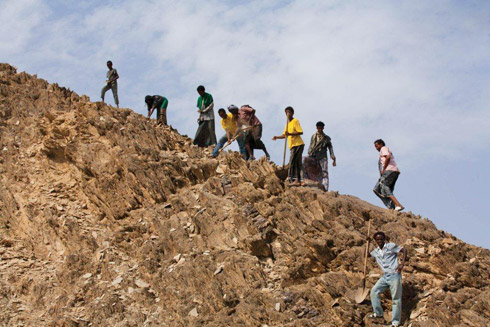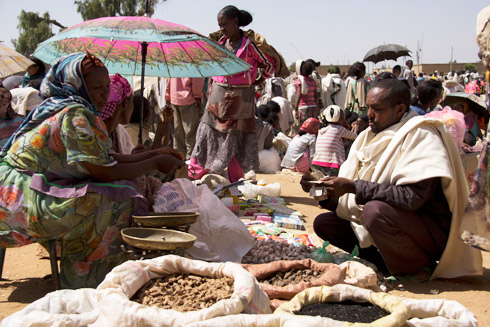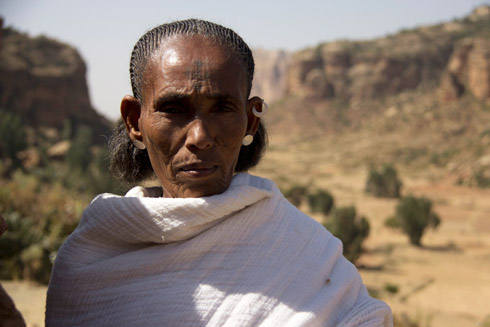Irish Aid’s 2014-2018 country programme supports the Ethiopian Government’s Growth and Transformation Plan (GTP 2011-2015). The aim of the programme is to facilitate the implementation of the country’s growth and poverty reduction efforts so that the poor benefit from, and contribute to, equitable economic, social and environmental development. The programme has been designed to contribute to one outcome, focused on household resilience, and the following two objectives:
Through our programme, we work with a variety of partners including government, UN agencies, international research institutions and non-governmental organisations (NGOs) across the whole territory of Ethiopia, but at regional level there is a concentration in Tigray and the Southern Nations, Nationalities and People’s Region (SNNPR).

Food insecurity continues to be a challenge for Ethiopia. Ireland provides some of the most vulnerable households in Ethiopia, who would otherwise need food aid through emergency channels, with predictable cash or food support in return for vital work on projects such as land rehabilitation.
The Productive Safety Net Programme is one of the largest social safety net programmes currently operating in Africa and it is making a significant contribution. Over seven and half million people benefitted from the programme in 2013.
Our support is focused on some of the most vulnerable households, especially those headed by women, so that they can cope better with shocks like failing rains or rising food prices. And, in this way, they can avoid resorting to short-term coping mechanisms like selling off their livestock.
We also work with organisations to improve farmer capacity and credit provision, as well as to develop food production capacities, value chains and alternative livelihood opportunities (on and off farm).
All this is done with a view to supporting people to become self-sufficient and graduate from the Productive Safety Net Programme. We work with a number of partners to help us implement this programme, including Farm Africa and SoS Sahel.
Ireland supports the Ethiopia Social Accountability Programme II (ESAP II), which seeks to ensure full accountability in the delivery of basic services at local level in areas such as health, education and HIV and AIDS services. To date the resources provided throught this programme have benefited 49 CSOs and their 61 partners in 223 woredas. As a result significant improvements have been reported in access to water, better maternal health facilities, additional classrooms, tuition for children in need and separate toilet facilities for girls in schools in rural and urban areas throughout the country. We support civil society and local communities’ input into the national government programmes and also the advancement of good government through engagement with local government service providers.
Ireland also funds the multi-donor Civil Society Support Programme which supports 328 CSOs across all regions to contribute to national development, poverty reduction and the advancement of good governance. With the assistance of NGOs, communities are now involved in identifying the needs of their own areas and making proposals for improvements. Decisions on priorities are made in consultation between local authorities and communities and take account of the needs of women and men and the most marginalised groups.
Giving communities a say is not only helping improve the quality of services they receive, it is also empowering communities to hold their local government authorities to account for the essential health and education services they require

We are assisting the Ethiopian Ministry of Health at national and regional levels in their efforts to improve people’s health. In particular, we prioritise funding to maternal and child health including accelerated training of midwives, the prevention of mother to child transmission of HIV and community mobilisation. Essential drugs, vaccines and insecticide-treated bednets are now more widely available in the fight against diseases. Irish Aid’s most significant contribution to the sector is through the Health Millennium Development Goal Performance Fund (MDG PF). In 2013, €4 million was provided.
We also have a strong approach to improving nutrition. We are supporting health extension workers to roll out community based platforms for nutrition education and promotion; micronutrient supplementation and de-worming including the provision of folic acid; and promoting breastfeeding, dietary diversity and complementary feeding. In addition we are working with partners to encourage fortification of staple foods in particular iodization and to promote optimal feeding practices and address moderate and acute malnutrition.

In 2013, our bilateral allocation was €27.2 million (see Summary of Partner Country Expenditure by Sector – Irish Aid Annual Report 2013-Annex 10). Our new five year strategy which covers the period 2014-2018 will largely maintain this annual budget figure, subject to the availability of resources.